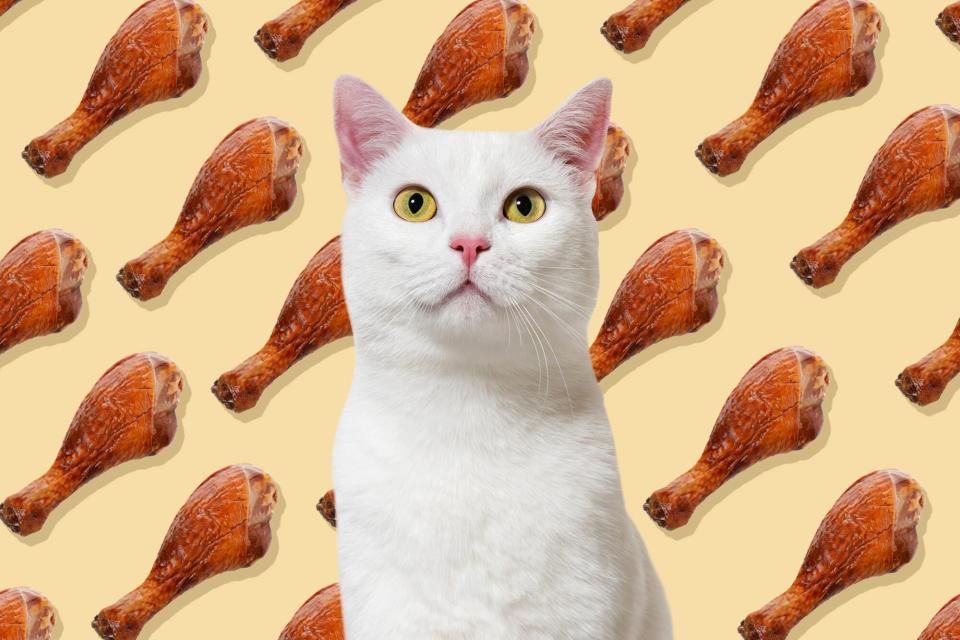Should You Let Your Cat Eat Turkey?
Whether you're roasting a huge holiday bird for Thanksgiving or making a lunch sandwich, when kitty smells turkey, she's going to be ultra-persuasive, hoping for a bite.
Cats are obligate carnivores, so of course, your feline wants to sink her teeth into some poultry. Many brands of kitten food contain chicken or turkey, as do various types of adult and senior cat food and treats.
These specialized food formulas help create a complete and balanced diet, ensuring your kitty not only receives the proper amount of protein but also taurine, a vital amino acid found only in meat, organ meats, and seafood. According to VCA Hospitals, taurine is essential for a feline's optimum digestion, heart function, immune system, reproductive function, and vision.
RELATED: 9 Best Vitamins for Cats and Expert Advice for Supplementing Your Kitty's Diet

Saddako / GlobalP / Getty / Yeji Kim
Can Cats Eat Turkey Meat Safely?
So, can cats have turkey? If you're using it as a treat to bond with or train your cat, an occasional nibble should be fine. Experts recommend that no more than 10 percent of a cat's diet be composed of treats in order to maintain a healthy weight, so you'll have to consider that, along with a few other things.
"If you decide to feed your pet a small bite of turkey, make sure it's boneless and well-cooked," says Tina Wismer, DVM, and senior director of the ASPCA Animal Poison Control Center. "However, don't allow your pets to overindulge, as they could wind up with a case of stomach upset, diarrhea, or even worse, an inflammatory condition of the pancreas known as pancreatitis." Well-cooked turkey means heated to a temperature of 165 degrees.
It's also best to avoid turkey coated in pan drippings, turkey gravy, or any other spices. Seasonings containing garlic, onion, chives, shallots, leeks, or scallions can give pets anemia and things like lemongrass, tarragon, oregano, and marjoram can cause vomiting and diarrhea in cats according to the ASPCA. Keep your feline away from the bones, too as those can be a choking hazard.
You can try leaving unwrapped and unseasoned turkey organ meats—liver, heart, and giblets—inside the bird as you roast it. Once cooked, dice them and set aside a tablespoon as your kitty's snack or as a dinner topper. Freeze the rest into small portions to thaw for future treats.
Is Deli Turkey or Ground Turkey Good or Bad for Cats?
Since turkey is generally okay, people often ask if cats can eat deli turkey, too. No—not unless you see it sliced behind the meat counter from an actual bird. Processed deli turkey is high in unhealthy sodium and nitrates. Any additives, such as smoke flavoring or other seasonings, aren't good for your feline friend either.
However, cats can eat ground turkey when it's cooked plain. If you want to make an easy homemade cat treat while whipping up some turkey burgers for yourself, simply cook the meat thoroughly, then form kitty-bite-sized patties before you season the meat for yourself. These are also easy to individually freeze and thaw when you want to give your feline some extra love.
RELATED: Just How Often Should I Really Be Feeding My Cat?
Other Foods Cats Can and Can't Eat
It's only natural to want to give your cat fun things to eat, especially when she's swatting at your snack plate! As long as you're mindful of the 10 percent treat rule, a healthy carnivore kitty can also sometimes have:
Apple flesh, but not seeds, core, or peel
Bananas (no peel)
Cooked eggs (no shell)
Peanut butter, as long as it's plain, unsalted, and free of xylitol
Squash and zucchini
A small bit of cooked salmon
A few kitties might also be able to have a nibble of cheese occasionally, but it's probably not a good idea, as most cats are lactose intolerant—so much for that saucer of milk! Here are some other human foods to avoid feeding your cat:
Alcohol
Citrus fruits
Coffee
Coconut water and flesh
Nuts
Raw or undercooked meats and fish (no sushi for kitty!)
Yeasted raw bread dough
Anything sweetened with xylitol
RELATED: 15 Toxic Human Foods You Should Never Feed Your Cat

